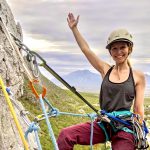-
Abigail Patchell BSc

Abby recently completed a BSc with an honors double major in Genetics and Environmental Science at the University of Western Ontario. Currently, she is working as a laboratory assistant in the Brain Behaviour Lab to help uncover the mechanisms behind learning and motor recovery in stroke populations. She has plans to continue to further her education and conduct research investigating the the genetic basis to neurological conditions. When she’s not in the lab, you can find her hiking with friends, teaching her lab mates to juggle, or enjoying a good book!
-
Anjana Rajendran MSc

Anjana is an PhD student in the Graduate Program in neuroscience. Anjana has completed her BSc in Behavioural Neuroscience and English Literature followed by a MSc in Neuroscience from the University of British Columbia. Her interest in disorders impacting the nervous system began with her involvement in investigating the ketogenic diet in mice models of multiple sclerosis at ICORD during her undergraduate degree. Seeing Dr. Lara Boyd’s work investigating how individual, neurobiological differences affect recovery, specifically using imaging, drew her to the lab where she completed her masters degree. Anjana’s master’s thesis explored using non-invasive brain stimulation to better understand interneuronal circuits in the motor cortex after stroke. Anjana hopes to continue exploring how we can tailor stroke recovery to match an individual’s neurological profile through her doctoral degree. When not in the lab you can find her exploring new coffee shops and bakeries in Vancouver, taking wacky fitness classes or making music.
-
Anna Daoust BSc Student

Anna is currently a BSc student in the Undergraduate Neuroscience program at the University of British Columbia, with a specialization in Behavioural and Cognitive Neuroscience. She is currently working in the Brain Behaviour Lab as a Research Assistant, working directly with participants to investigate novel rehabilitation methods in the context of stroke recovery. She hopes to continue working with clinical populations within the fields of neuropsychology and neurorehabilitation. Outside of the lab, you can find her playing soccer with her friends, attending a dance class, or crossing a new hike off of her bucket list.
-
Bev Larssen MSc

Bev Larssen is currently a student in the MPT/PhD program at the University of British Columbia. Bev completed her BHK and MSc under the supervision of Dr. Nicola Hodges in the School of Kinesiology, also at UBC. During her undergraduate and MSc programs, Bev studied the role of feedback and observational practice in adaptation learning. After completing her physical therapy training, with the supervision of Dr. Lara Boyd, she plans to study the use of robotic devices in upper-limb training interventions, and how they can be used as a tool to facilitate motor performance and learning.
-
Chris Lamb MPT

Chris is a MSc student in the School of Rehabilitation Sciences at UBC in the Brain Behaviour Lab. Chris Lamb completed his undergraduate degree from the University of Victoria in 2003, and then completed his Master of Physical Therapy from the University of Western Ontario in 2006. Chris worked as a physiotherapist in private practice from 2006-2023, initially in sports therapy, before gradually shifting towards treating people with more complex/chronic orthopaedic conditions. He returned to school in the fall of 2023 under the supervision of Dr. Lara Boyd, with a research focus on central nervous system pain mechanisms. Specifically, his research will investigate the maladaptive sensory/motor neuroplastic changes associated with symptomatic knee osteoarthritis. He hopes these findings better direct exercise rehabilitation strategies in this population.
-
Christy Jones MSc

Christy is a PhD student in the Graduate Program in Rehabilitation Sciences. Christy completed her undergraduate training in Kinesiology at UBC and at the Queensland University of Technology and her Master’s degree in Neuroscience at McMaster University. Her past research has looked at neuroplasticity in healthy and clinical populations using non-invasive brain stimulation as well as balance and gait in Parkinson’s disease. Currently, she is interested in using neurotechnology and portable devices for rehabilitation of individuals following stroke. Her thesis is focused specifically on how we can use EEG-based biomarkers as objective measures of motor function. She is currently completing a Mitacs Accelerate Fellowship with a Surrey-based health technology company, HealthTech Connex.
When not in the lab, you can find her in the mountains, rock climbing, mountain biking, hiking and skiing and is always happy to share her love of these activities with anyone who is interested!
-
Cristina Rubino MSc

Cristina Rubino is investigating how the visual system supports learning of novel motor skills. Specifically, she is using the KINARM robot with integrated eye-tracking to uncover how eye and hand movements work together. She is also using functional and structural neuroimaging to discover how brain networks that support visuomotor function shift after motor learning. Cristina’s goal is to enhance our understanding of visuomotor dysfunction after stroke, and promote visuomotor recovery for people living with stroke. Outside the lab, Cristina likes to explore new places through road biking, hiking, snowboarding, and playing Ultimate Frisbee.
-
Julia Dahlby MPT

Julia is a PhD student and physiotherapist, studying the effect of the reward network on motor learning after stroke, and the influence of biological sex. She hopes to discover additional mechanisms as to why some recover faster after stroke, and what tools we can utilize to optimize recovery. When she’s not in the lab, she can be found in the clinic treating patients, or adventuring in the local mountains.
-
Justin William Andrushko PhD

Justin Andrushko is a Postdoctoral Research Fellow in the Brain Behaviour Laboratory. Justin completed his Ph.D. in the College of Kinesiology at the University of Saskatchewan where he worked with Dr. Jonathan Farthing. Justin’s previous research focused on the inter-limb transfer of unilateral motor training to the opposite untrained limb, often termed cross-education, and understanding how the brain and nervous system adapt to motor training and disuse. Justin has held visiting researcher appointments at Deakin University in Melbourne Australia and at the University of Oxford in Oxford England where he worked with Dr. Ashlee Hendy (Deakin) and Professor Charlotte Stagg (Oxford). For his postdoctoral research Justin is interested in determining the role of non-primary descending motor pathways in post-stroke motor recovery in individuals with severe hemiparesis.
-
Kayla Yip BSc Student

Kayla is currently a student at the University of Waterloo pursuing a BSc in Kinesiology with a specialization in Rehabilitation Sciences. She is currently on an 8-month co-op term with the Brain Behaviour Lab, where her previous exposure to transcranial magnetic stimulation (TMS) sparked interest in Dr. Boyd’s lab and their work with interhemispheric inhibition and rTMS. She hopes to pursue a future in clinical neurorehabilitation and contributing to developing healthcare for people with neurological disease/disorder. Outside of the lab, Kayla enjoys going on runs to explore the city, trying out new recipes, or having her lab mates teach her how to juggle!
-
Nathan Lam BSc Student

Nathan is a BSc candidate in Honours Cellular, Anatomical, and Physiological Sciences at UBC. At the Brain Behaviour Lab, Nathan helps explore the interdisciplinary relationship between stroke rehabilitation, motor learning, and neurophysiology changes. Using machine learning and motion capture technology, he investigates kinematic movement through the use of biomarkers to predict motor function after stroke. Currently, he is working on a directed studies project on the effects of sex and age differences in motor cortex excitability levels after stroke. In his spare time, Nathan enjoys playing ultimate frisbee, finding new books to read, and cycling along the Stanley Park seawall.
-
Negin Motamed Yeganeh PhD

Negin Motamed Yeganeh is a Postdoctoral Research Fellow. She completed her Ph.D. in Psychology at the University of Tehran, Iran. During her Ph.D. program, she worked with Dr. Rachel Weber and Dr. Lara Boyd on the Arrowsmith Brain imaging study at the University of British Columbia. The goal of this research was to improve the understanding of learning disabilities and develop better educational interventions for children. After earning her Ph.D., Negin returned to UBC to continue her work in the field of learning disabilities and neuropsychological assessments. For her postdoctoral research, she is investigating whether opera training can sculpt the brain to enhance learning. She is working with a team of interdisciplinary experts at UBC to determine if intensive language practice through opera can result in changes in brain structure and function that improve learning, memory, and executive function. This work will further the knowledge in the field of music and language psychology.
Research Interests
Neuropsychology and Neuropsychological Assessment, Cognitive Development, Executive Functioning, Learning Disability, Psycholinguistics
-
Ronan Denyer BA

Ronan Denyer completed a Bachelor’s Degree in Psychology at Trinity College Dublin, Ireland, where his final year thesis project investigating the neurophysiological basis of interlimb transfer using transcranial magnetic stimulation (TMS) was supervised by Dr. Richard Carson. Ronan moved to Vancouver in 2017 to pursue a PhD in Neuroscience at The University of British Columbia under the supervision of Dr. Lara Boyd. His PhD thesis research in the Brain Behaviour Lab aims to better understand the neural control of simple and complex bimanual movements by combining neuroimaging, brain stimulation, and behavioural methodologies.
-
Shie Rinat MSc

Shie is a PhD student in the Rehabilitation Sciences program. She completed her BOT at Tel Aviv University, and her MSc at UBC. Her graduate work with Dr. Jill Zwicker investigated neural correlates of Developmental Coordination Disorder. Shie’s passion for stroke research began while working as an occupational therapist in an inpatient neurological rehabilitation unit in Tel-Aviv. Her doctoral work aims to investigate stroke in women, and specifically, the effect of sex hormones and past pregnancies on stroke risk and recovery in women. Although women account for 60% of stroke-related deaths, they are often under-represented in stroke research. As a result, the unique risk factors affecting women’s stroke risk and recovery are largely understudied and poorly understood. The outcomes of Shie’s research will help close this gap in knowledge, and promote care for women with stroke.